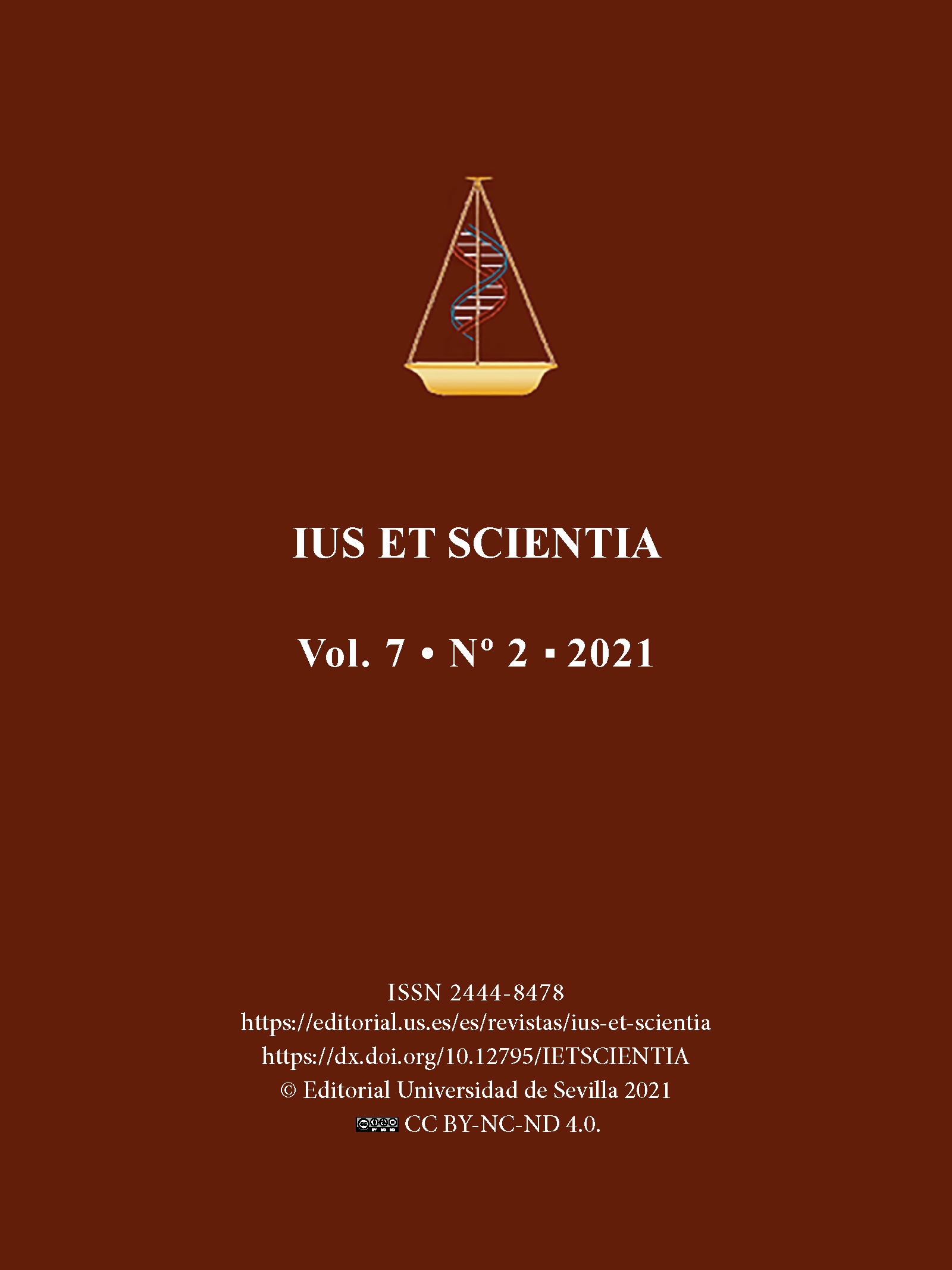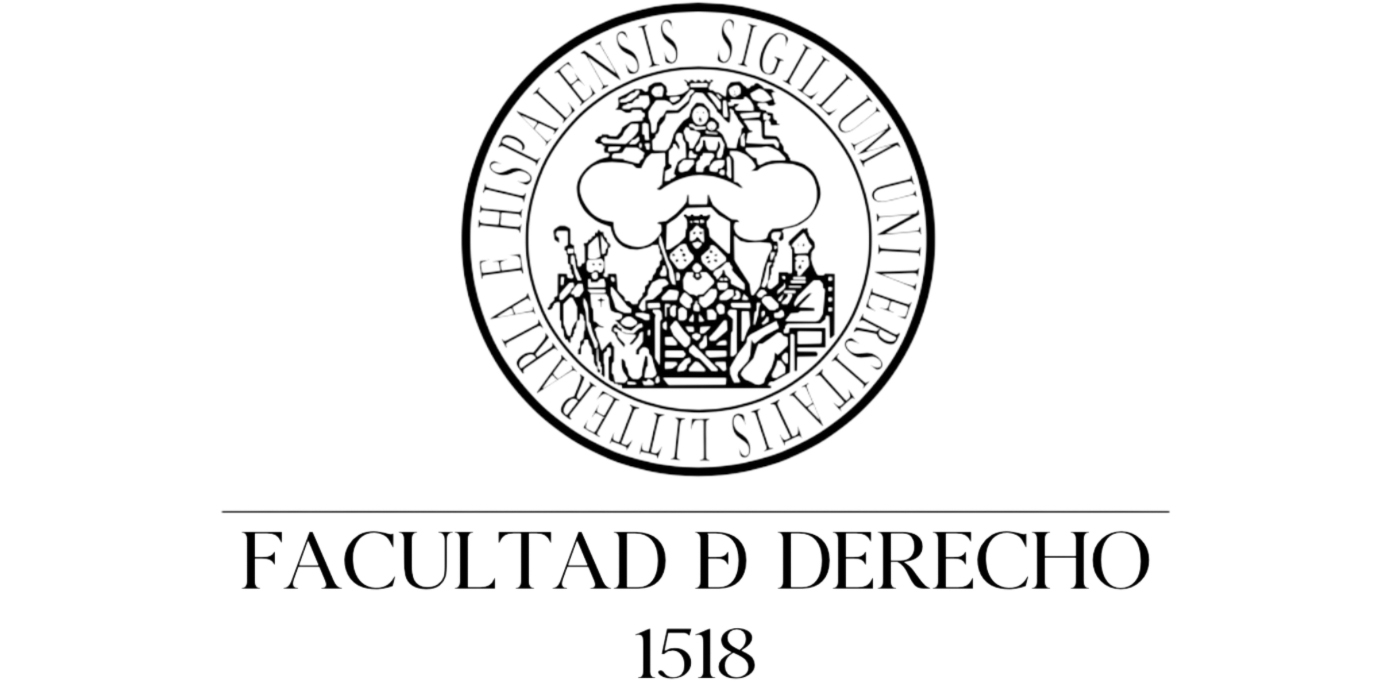Inteligencia Artificial y derecho. Ni dioses ni bestias ni cíborgs: homo juridicus
DOI:
https://doi.org/10.12795/IETSCIENTIA.2021.i01.08Palabras clave:
Inteligencia Artificial, Bioderecho, Filosofía del derecho, Ética, TranshumanismoResumen
El presente trabajo parte de una defensa del Derecho de los sistemas jurídicos constitucionalizados, por el lugar central que otorga a los derechos humanos, cuya base es la dignidad de la persona humana. Destaca asimismo que la aspiración de realización del valor justicia nos caracteriza como Homo Juridicus. Todo lo cual encuentra justificación en una ética humanista que, en tanto integrante de una cultura jurídica, concuerda con el objeto de estudio del Bioderecho Internacional.
En ese marco, luego de identificar los problemas y riesgos de la Inteligencia Artificial, de conceptualizar y caracterizar la posición transhumanista, mediante un abordaje ético se contrapone esta última visión con aquella biojurídica. La conclusión es que esta última es la única que proporciona una adecuada justificación a las acciones y límites normativos.
En ese marco, luego de identificar los problemas y riesgos de la Inteligencia Artificial, de conceptualizar y caracterizar la posición transhumanista, mediante un abordaje ético se contrapone esta última visión con aquella biojurídica. La conclusión es que esta última es la única que proporciona una adecuada justificación a las acciones y límites normativos.
Descargas
Citas
Atienza, M. (2020). Una apología del derecho y otros ensayos. Trotta.
Bostrom, N. (2011). Una historia del pensamiento transhumanista. Argumentos de Razón Técnica, 14, 157-191. http://institucional.us.es/revistas/argumentos/14/art_7.pdf
Buchanan, A. et al (2009). Genetics and Justice. Cambridge University Press.
Bugajka, A. y Misseri, L. (2020). Sobre la posibilidad de una ética poshumana: propuesta de un enfoque normativo combinado. Isegoría, 63, 425-449.
Burguet Castell, J. (2017). La singularidad tecnológica, en www.conec.es, Acceso libre: http://www.conec.es/ciencia/la-singularitat-tecnologica/ Recuperado el: 09/07/2020.
Campione, R. (2019). A vueltas con el Transhumanismo: cuestiones de futuro imperfecto. Cuadernos Electrónicos de Filosofía del Derecho, 40, 45-67. Universidad de Valencia.
Carabantes López, M. (2014). Inteligencia Artificial: Condiciones de posibilidad técnicas y sociales para la creación de Máquinas Pensantes. Tesis doctoral. Universidad Complutense Madrid. Acceso libre en: https://eprints.ucm.es/24630/1/T35134.pdf
Casado González, M. (2021). Enciclopedia de Bioderecho y Bioética. Romeo Casabona, C. M. (Director), Cátedra de Derecho y Genoma Humano. Recuperado el 01.05.2021. https://enciclopedia-bioderecho.com/voces
Coeckelbergh, M. (2021). Ética de la Inteligencia Artificial, trad. Lucas Álvarez Canga, Cátedra, versión e-book.
Escajedo San Epifanio, L. (2021). Biotecnología. Enciclopedia de Bioderecho y Bioética. Romeo Casabona, C. M. (Director), Cátedra de Derecho y Genoma Humano. Recuperado el 01.05.2021. https://enciclopedia-bioderecho.com/voces
Figueroa Yañez, G. (2021). Bioderecho. Enciclopedia de Bioderecho y Bioética. Romeo Casabona, C. M. (Director), Cátedra de Derecho y Genoma Humano. Recuperado el 01.05.2021. https://enciclopedia-bioderecho.com
García San José, D. I. (2010). International Bio Law. Laborum.
Garzón Valdés, E. (2006). ¿Cuál es la relevancia moral del concepto de dignidad humana? Fontamara.
Garzón Valdés, E. (2003). Algunos comentarios sobre lo íntimo, lo privado y lo público. Claves de razón práctica, 137, 14-24.
Garzón Valdés, E. (1998). Privacidad y publicidad. Doxa. Cuadernos de Filosofía del derecho, 21, 223-244.
George, A. (2014). La epopeya de Gilgamesh, trad. Fabián Chueca Crespo, Edición de Bolsillo, versión e-book.
Gilligan, C. (2003). In a Different Voice. Psychological Theory and Women’s Development, Thirty-eighth printing, Harvard University Press.
Gilligan, C. (2013). El daño moral y la ética del cuidado. Cuadernos de la Fundació Víctor Grífols i Lucas, 30, 10-39. Edit. Fundació Víctor Grífols i Lucas.
Habermas, J. (1985). Conciencia moral y acción comunicativa. Península.
Habermas, J. (1993). El discurso filosófico de la modernidad (Doce lecciones). Versión castellana de Manuel Jiménez Redondo, 1ª ed., reimp. Taurus.
Habermas, J. (2002). El futuro de la naturaleza humana. ¿Hacia una eugenesia liberal?, trad. de R. S. Carbó. Paidós.
Habermas, J. (2010). El concepto de dignidad humana y la utopía realista de los derechos humanos. Diánoia, vol. LV, 64, 3-25.
Harari, Y. (2020). 21 lecciones para el siglo XXI. Trad. Joandomènec Ros. Debate.
Harari, Y. (2020). Homo Deus. Trad. Joandomènec Ros. Debate.
Huxley, J. (1967). Religión sin revelación. Sudamericana.
Jonas, H. (1995). El principio de responsabilidad. Ensayo de una ética para la civilización tecnológica. Trad. Javier Ma. Fernández Retenaga. Herder.
Jonas, H. (1997). Técnica, medicina y ética: sobre la práctica del principio de responsabilidad. Trad. Carlos Fortea Gil, Paidós.
Juan, G. R. (2020a). Inteligencia Artificial y Filosofía del Bioderecho: una tesis crítica y una propuesta ética. IUS ET SCIENTIA, Vol. 6, 2. https://dx.doi.org/10.12795/IETSCIENTIA Universidad de Sevilla.
Juan, G. R. (2020b). Leer como abogado, abogar como lector. Máquinas como yo, de Ian McEwan y la Inteligencia Artificial. Revista de Derecho de Familia, RDF 95, 295, Editorial Abeledo-Perrot (Thomson Reuters-La Ley). Cita Online: AR/DOC/1835/2020.
Juan, G. R. (2021). ¿Transhumanismo o ética humanista? Reflexiones desde la filosofía del bioderecho. Libro colectivo. Facultad de Derecho, Universidad de Buenos Aires (en prensa).
Kant, I. (2012). Fundamentación de la metafísica de las costumbres, trad. Roberto Rodríguez Aramayo, 2ª Ed. Alianza.
Le Breton, D. (2009). El sabor del mundo. Una antropología de los sentidos, trad. Heber Cardoso. Nueva Visión.
Marinho Amorim, H. y Cardoso, R. C. (2019). O ciborgue no limiar da humanidade: redefinindo a pessoa natural. Revista de Bioética y Derecho Perspectivas Bioéticas, 46, 67-84. Universitat de Barcelona. Acceso público en: www.bioeticayderecho.ub.edu
Martino, A. (2020). 40 Años de inteligencia artificial y derecho: novedades. ¿Por qué se le teme al autómata juez que crearán en Estonia? Astrea. Recuperado el 23.02.2020. https://www.astrea.com.ar/resources/doctrina/doctrina0507.pdf
McEwan, I. (2019). Máquinas como yo y gente como vosotros, trad. Jesús Zulaika, Anagrama.
Palmerini, E. (2017). Robótica y derecho: sugerencias, confluencias, evoluciones en el marco de una investigación europea. Trad. Indira Díaz Lindao. Revista de Derecho Privado, 32, 53-97.
Parfit, D. (2004). Razones y personas, trad. Mariano Rodríguez González. A. Machado Libros.
Pérez Luño, A. (2021). El posthumanismo no es un humanismo. Doxa. Cuadernos de Filosofía del Derecho, 44, 291-312.
Sadin, E. (2018). La humanidad aumentada. La administración digital del mundo. Trad. Javier Blanco y Cecilia Paccazochi, 2ª reimp. Caja Negra.
Savulescu, J. (2001). Procreative beneficence: why we should select the best children. Bioethics, 15, 413-426.
Savulescu, J. (2016). Genetic interventions and the ethics of enhancement of human beings. Gazeta de Antropología, 32 (2), artículo 07. Universidad de Granada. http://hdl.handle.net/10481/43310
Silva Castillo, J. (2000). Gilgamesh o la angustia por la muerte (poema babilonio), trad. directa del acadio, 4ª ed. corregida. El Colegio de México.
Singer, P. (2002). De compras por el supermercado genético. Isegoría, 27, 19-40.
Supiot, A. (2012). Homo juridicus. Ensayo sobre la función antropológica del derecho, trad. Silvio Mattoni, 2ª ed., Siglo XXI.
Vinge, V. (1993). The coming technological singularity. Whole Earth Review Winter issue.
Publicado
Cómo citar
Número
Sección
Licencia
Aquellos autores/as que tengan publicaciones con esta revista, aceptan los términos siguientes:- Los autores/as conservarán sus derechos de autor y garantizarán a la revista el derecho de primera publicación de su obra, el cuál estará simultáneamente sujeto a la Licencia de reconocimiento de Creative Commons que permite a terceros compartir la obra siempre que se indique su autor y su primera publicación esta revista.
- Los autores/as podrán adoptar otros acuerdos de licencia no exclusiva de distribución de la versión de la obra publicada (p. ej.: depositarla en un archivo telemático institucional o publicarla en un volumen monográfico) siempre que se indique la publicación inicial en esta revista.
- Se permite y recomienda a los autores/as difundir su obra a través de Internet (p. ej.: en archivos telemáticos institucionales o en su página web) antes y durante el proceso de envío, lo cual puede producir intercambios interesantes y aumentar las citas de la obra publicada. (Véase El efecto del acceso abierto).
- Resumen 525
- pdf 583
- html 204






